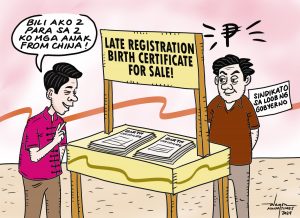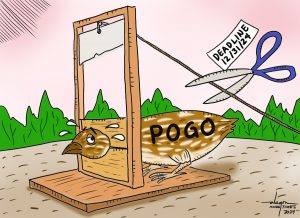
SOME columns back, we wrote about the advocacy of Filipino world-famous urban designer Felino “Jun” Palafox pushing for the creation of more cities not just in the Philippines but the whole world. Palafox, in a gathering of real estate developers, said that only by creating more cities can development be more effective and easily achievable.
We followed up that column subject of ours with another item about our supposed platform of government if we were a candidate for mayor of Davao City. In that supposed platform, we would have pushed for the division of Davao City into two local governments (cities) because we see in its realization the solution to such burgeoning problems in the city as the growing daily traffic gridlock, the recurrent flash floods that inundated some parts of the city especially in the downtown area, the agglomeration of informal settlers, the increasing criminality, and of course the growing disenchantment of people in the low pace of the delivery of various government services especially to the residents in the city’s most isolated areas.
As our premise, of course, that is supposed to be our platform of government “if we were a candidate for mayor.” But we are not and we do not have any iota of an idea that we would have that kind of wishful thinking. And we have never thought that other than Palafox there were other people who shared his idea of creating more cities much earlier, and even went farther by saying that “mayors should rule the world if the now borderless problems should be easily contained without the hustles of the issues of bureaucracy and sovereignty.”
Yes, yesterday we received a post on social media through the YouTube platform shared to us by our friend consumer advocate Wennie Gorres. It is a speech delivered by Benjamin Barber, a mainstay in the YouTube channel TEDtalks. The talk was delivered in Edinburgh, Scotland in 2013.
According to Barber 21st century cross-border and other transnational problems suffered by nations all over the world are proposed to be solved with methods based on 17th century-developed political institutions. Barber claims that world problems like climate deterioration, terrorism, pandemics, war, hunger, uncontrolled migrations, etc., etc. persist even with the establishment of the so-called League of Nations (now United Nations). He argues that leaders of nations are hesitant to come up with and share solutions to such problems using the issue of sovereignty as their deterrent.
Barber postulates that cities should be given the responsibility of formulating solutions to problems because their leaders and people know best how to solve them. Cities he said, are political institutions where civilization and culture were born, the cradle of democracy, as well as venues where people come together to create democracy and protest against those who want to take the freedom afforded by it.
Barber believes that with cities, leaders are home-grown and they can work well with their people in crafting solutions to problems that affect their city from the outside or emanate from it; that cities are more effective in implementing solutions because they are less deterred by bureaucracy in the national level. Besides, if cities are given flexibility in confronting its problem they may be able to come up with faster solutions as they are now sharing best practices in governance. Yes, what with sister city agreements?
But of course, Barber’s talking of cities as the best institutions for an effective solution to rising problems should not lose track of the fact that it can only happen if cities and other local government units for that matter, are clothed with corresponding autonomy that allows them enough elbow room to have their ways done without fear of rebuke by the national government.
Hence, as far as the Philippine setting is concerned there has to be an amendment in our national Charter to allow cities and provinces to do the necessary to get away from the stranglehold of national restrictions under our existing system of governance.
Supposedly we were into it already before the onset of the 2016 national elections. The Philippines’ current leader President Rodrigo Duterte won largely because of that promise of a Federal form of government. Had the promise materialized, it would have been easy for the Barber proposal for an effective solution to problems of governance whether global or endemic in nature.
Unfortunately, such a case is still a nebulous dream in the Philippines, and in all likelihood, it can never happen in the country. In fact, Federalism is no longer being talked about in the forthcoming election.
So the country will remain among “nations of sovereign states with separate jurisdictions and claiming to be able to solve its own problems and those of its people.” That is why it should not surprise us Filipinos if local governments will be blaming our national government for whatever status of the CoViD 19 pandemic their areas are into.
Yes, the Barber idea for “cities to rule the world” instead of nations is ideal. But without doubt, it is something easier said than done more so in the country’s political system. But, of course, hope springs eternal, they say.


